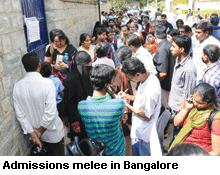January is a cruel month for young parents of two-four-year-olds in Bangalore (pop.7 million). A large number of them had to spend late hours even as night temperatures dropped to 10-12 degrees celsius, to be in the forefront of queues to obtain admission forms to get their children into pre-primary/nursery sections of the city’s top CBSE and CISCE private schools. Others who preferred the soft option paid up to Rs.10,000 to touts to secure admission forms for popular day schools. Admission into the pre-primaries of reputed CBSE/CISCE schools is serious business. It ensures smooth progression of children right up to class XII.
 Bangalore’s 186 CBSE/ICSE-affiliated schools are not obliged to follow the admission calendar of the Karnataka government’s department of public instruction which has decreed that all aided and unaided schools affiliated with the Karnataka Secondary Education Examination Board (KSEEB) should begin their adm-ission process for the new academic year beginning June on April 1. With the 7,854 private unaided and aided schools affiliated with KSEEB the last choice of the garden city’s upwardly mobile middle class, and free-of-charge government schools a no-go zone, middle class parents are ready to pay any price for admission of their tiny tots into pre-primaries of the city’s top-ranked schools.
Bangalore’s 186 CBSE/ICSE-affiliated schools are not obliged to follow the admission calendar of the Karnataka government’s department of public instruction which has decreed that all aided and unaided schools affiliated with the Karnataka Secondary Education Examination Board (KSEEB) should begin their adm-ission process for the new academic year beginning June on April 1. With the 7,854 private unaided and aided schools affiliated with KSEEB the last choice of the garden city’s upwardly mobile middle class, and free-of-charge government schools a no-go zone, middle class parents are ready to pay any price for admission of their tiny tots into pre-primaries of the city’s top-ranked schools.
“The past few months have been crazy. I have spent almost Rs.10,000 purchasing hard-to-get application forms of four-five schools. In one of the schools, my three-year-old was rejected even after a good interview session with the teachers. I wonder what are their criteria for selecting a three-year-old. Meanwhile we have been approached by agents with inside connections who claim they can ensure admission into the nurseries of several well-reputed schools for a fee of Rs.5-6 lakh. The only option left to us now is to use every contact because we don’t want to put him into the pre-primary of a state board school,” says a parent, who preferred to remain anonymous.
Quite obviously, the demand for admissions into the pre-primaries of the garden city’s top-ranked and mid-priced (Rs.50,000-1 lakh per year) private English-medium schools far exceeds supply. But this mad annual stampede doesn’t seem to worry politicians and bureaucrats in Karnataka’s education ministry in the least. Beating its own drum for Kannada as the sole medium of instruction in all primary schools, the education ministry has imposed a plethora of restrictions on the promotion of English medium private schools preferred by the public, especially Bangalore’s fast-expanding middle class. Education entrepreneurs ready, willing and able to meet the rising demand for private English-medium schools are flummoxed by the myriad hurdles strewn in their path by the state’s venal politician-bureaucrat nexus, notorious for extorting bribes (Karnataka was voted the country’s most corrupt state in a recent Transparency India poll of businessmen).
According to a state government ordinance of 1994, all primary schools promoted after that year are obliged to make Kannada (or mother tongue) the medium of instruction in classes I-V — a law practiced more in the breach than observance, with pay-offs to greedy education ministry officials for turning a blind eye, the rule. Although after prolonged litigation in 2008, the Karnataka high court struck down the ordinance ruling that parents have a fundamental right to choose the medium of instruction they deem fit for their children, education bureaucrats continue to stubbornly refuse the all-important NOC (no objection certificate) required for promotion of English-medium primary schools in the state.
“There is a simple solution to this problem. The state government itself needs to promote quality English-medium schools to meet public demand. This can be done quickly by inviting managements of well reputed private school chains such as Bharatiya Vidya Bhavan or Delhi Public School to promote schools with the government under the public-private partnership model. Simultaneously, it urgently needs to upgrade its own K-12 schools and bring them on a par with private schools affiliated with CBSE/ICSE boards. This will make free-of-charge government schools attractive to middle class parents. Moreover, the state government must immediately notify the Right to Education Act under which all screening procedures for admission are prohibited,” suggests Niranjan Aradhya, fellow, Centre for Child and Law, National Law School of India University, Bangalore.
But Aradhya’s solution pre-supposes government will to stem the rot. With huge rents extracted from the few edupreneurs willing to run the gauntlet of multiple government clearances to promote English-medium schools, the neta-babu nexus of the country’s most graft-riddled state is content with the status quo. Therefore for young parents who prefer to ignore the large and growing number of independent stand-alone excellent preschools (See EW October cover story), long night vigils will continue every winter.
Swati Roy (Bangalore)